H.P. Lovecraft: The Style Adjectival
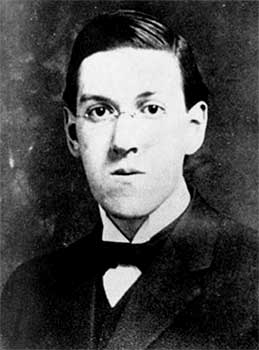 Everyone has their heresies. Things they believe, or things they perceive to be true, with which many if not most authorities would disagree. That’s especially so, I think, with readers. Everybody who reads is going to have a list of writers who they feel are unjustly praised or unjustly criticised. Or, in some cases, writers whose work is wrongly praised or criticised; writers accepted as great, for example, but who you think are great for some other reason than is held by most people.
Everyone has their heresies. Things they believe, or things they perceive to be true, with which many if not most authorities would disagree. That’s especially so, I think, with readers. Everybody who reads is going to have a list of writers who they feel are unjustly praised or unjustly criticised. Or, in some cases, writers whose work is wrongly praised or criticised; writers accepted as great, for example, but who you think are great for some other reason than is held by most people.
I’ve got a bunch of these heresies. I want to talk here about one such: I believe that H.P. Lovecraft is not only a major writer, but a major stylist. I think his use of language is powerful and original. I think he’s often misread as failing to do things he has no interest in, and I think what he is interested in doing is not often discussed on its own terms.
Before going on to explain what I mean, I should probably make a couple of points clear. Firstly, I have no particular interest in discussing Lovecraft`s life and personality except to note that the desire of many critics to focus on Lovecraft as an individual may suggest a need to evade dealing with the horrors of his fiction. In any event, Lovecraft was not a static thinker; his perspectives and opinions on many things changed over the course of his life. In writing this post, therefore, I’m going to try to talk about “Lovecraft” as a back-formation from the texts of his stories; I mean simply that I’m going to write about what I see in the fiction, treated as a whole, and not worry much over the details of his biography.
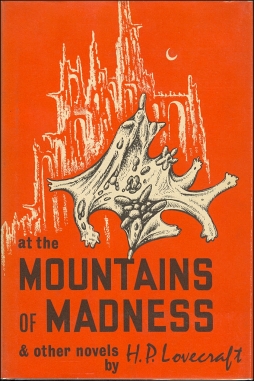 Secondly, in talking about “style” I think roughly of M.H. Abrams’ definition: “the manner of linguistic expression in prose or verse — it is how speakers or writers say whatever it is that they say.” More precisely, I think of style as one of three interrelated aspects of a narrative, along with structure and theme. Theme is the core of the work, the motivating idea that drives the thing to be written; structure is the shaping idea, the form of the work; and style is the use of language that creates the immediate reading experience. I think that in the best works these aspects are deeply connected to each other; choice of point of view, for example, is fundamentally a structural question (who’s telling the story, and what do they really know about it?), but probably will be affected by thematic concerns (how does one position the narrator to let the story make its point?), and certainly will have stylistic significance (what language is natural to the narrator or narrators, and how do they express themselves?).
Secondly, in talking about “style” I think roughly of M.H. Abrams’ definition: “the manner of linguistic expression in prose or verse — it is how speakers or writers say whatever it is that they say.” More precisely, I think of style as one of three interrelated aspects of a narrative, along with structure and theme. Theme is the core of the work, the motivating idea that drives the thing to be written; structure is the shaping idea, the form of the work; and style is the use of language that creates the immediate reading experience. I think that in the best works these aspects are deeply connected to each other; choice of point of view, for example, is fundamentally a structural question (who’s telling the story, and what do they really know about it?), but probably will be affected by thematic concerns (how does one position the narrator to let the story make its point?), and certainly will have stylistic significance (what language is natural to the narrator or narrators, and how do they express themselves?).
I say all this to note that if I seem to be wandering from the specific topic of Lovecraft’s style, it’s because I think of style as fundamentally related to structure and theme. In fact, I’d say one of the powerful aspects of Lovecraft’s style is specifically the fact that it relates to theme and structure with a particular directness. Much of what follows is an attempt to make this clear.
I’m going to begin, though, by considering what seems to be the most common criticism of Lovecraft’s style. Famously, it relies heavily on the use of the adjective. This has led to his writing being characterised in terms like ‘florid,’ or ‘verbose,’ or … well, you can imagine.
At a certain level, tastes can’t be disputed; if a reader really doesn’t care for a certain writer’s style, then that’s probably the end of it. But ideally a critic can, especially in the case of a major writer, point out the positive aspects in a style so that even if a reader still doesn’t like what they’re reading, they can at least appreciate what’s good about it. I don’t dispute the fact that Lovecraft uses adjectives a lot. What I want to do is argue that the adjectives make his style not only distinctive but powerful.
Constant use of adjectives is often considered a sign of slackness in writing. Strunk and White’s famous writing guide The Elements of Style makes this point strongly: “Write with nouns and verbs, not with adjectives and adverbs,” they say. “The adjective hasn’t been built that can pull a weak or inaccurate noun out of a tight place.” But then they go on to note that adjectvies and adverbs “are indispensable parts of speech” that can “surprise us with their power,” giving examples before concluding, somewhat confusedly, “In general, however, it is nouns and verbs, not their assistants, that give to good writing its toughness and color.”
It’s not hard to find people who disagree with Strunk and White about a great many things, especially their stylistic advice (you can see a particularly famous piece here). I’ll just point out that even they don’t say that adjectives are inherently bad. Further, it seems to me that if nouns and verbs can give writing toughness and colour, then the right adjective can be precise, even startling. One of the most evocative lines of poetry I’ve ever read was in Keats’ “Ode to a Nightingale,” imagining the Biblical Ruth “when, sick for home, / She stood in tears among the alien corn;” I remember reading the line for the first time and being awed by the imagination that created “alien corn,” that put together those two words that quite possibly no English speaker had ever before linked, and finding in doing so exactly the right phrase to get his meaning across.
So: adjectives, even an adjective like “alien,” can be evocative and poetically powerful. But how about Lovecraft’s use of adjectives? It has been repeatedly argued that his excessive reliance on them, however brilliant they may be, overwhelm his stories. Here’s Lin Carter, in his 1972 study Lovecraft: A Look Behind the Cthulhu Mythos. He’s talking about the early story “The Nameless City”:
The story is overwritten, over-dramatic, and the mood of mounting horror is applied in a very artificial manner. Rather than creating in the reader a mood of terror, Lovecraft describes a mood of terror: the emotion is applied in the adjectives — the valley in which the city lies is “terrible”; the ruins themselves are of an “unwholesome” antiquity; certain of the altars and stones “suggested forbidden rites of terrible, revolting, and inexplicable nature.” Of course, if you stop to think about it, such terms are meaningless. A stone is a stone, a valley is a valley, and ruins are merely ruins. Decking them out with a variety of shuddersome adjectives does not make them intrinsically shuddersome. Throughout most of his subsequent career, Lovecraft had to struggle against this tendency to tell his readers that such-and-such were horrible, loathsome, and shocking, rather than making the reader feel these qualities. It was one of the bad habits he fell into, and, perhaps, it is the flaw of the amateur.
I think Carter’s absolutely wrong in his analysis. Not in his description, but his evaluation of Lovecraft’s effects. It’s accurate to say that Lovecraft describes a mood of terror, for example; but I’d argue that by doing so, Lovecraft creates a mood of terror by sympathy in the reader. I think that his descriptions work upon the imagination of the reader to create an emotional effect in the reader’s mind mirroring the mood he describes in prose. This technique is fundamentally different from the horror which encourages the reader to sympathise with a character, and then puts that character through various horrific experiences. Lovecraft’s leading his audience to imaginatively call up horror within themselves in a way similar to what he does as a writer.
I don’t think it’s a coincidence that in his essay “Supernatural Horror in Literature” Lovecraft praised Lord Dunsany for doing something along these lines: “To the truly imaginative he is a talisman and a key unlocking rich storehouses of dream and fragmentary memory; so that we may think of him not only as a poet, but as one who makes each reader a poet as well.” Lovecraft was obviously deeply inspired by Dunsany in such stylistically lush stories as the wonderful “Dream-Quest of Unknown Kadath”, but I’d argue that he was trying even in many of his other stories to accomplish what he felt Dunsany did so well: call up imagination, and make readers into writers.
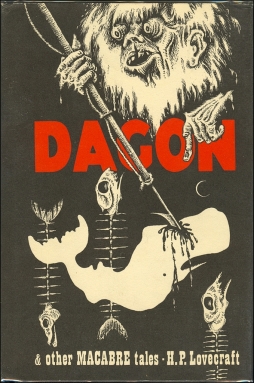 What Carter sees as a struggle against the use of vague adjectives, I see as a conscious attempt on Lovecraft’s part to explore a style based not only on this evocative use of language, but also on the description of a subjective perception. “The Nameless City,” like most of Lovecraft’s mature work, is told in the first person. Although the narrator’s character isn’t explored in a way that we associate with realistic depth, I think the adjectives Carter deplores actually serve to give us the man’s mindset.
What Carter sees as a struggle against the use of vague adjectives, I see as a conscious attempt on Lovecraft’s part to explore a style based not only on this evocative use of language, but also on the description of a subjective perception. “The Nameless City,” like most of Lovecraft’s mature work, is told in the first person. Although the narrator’s character isn’t explored in a way that we associate with realistic depth, I think the adjectives Carter deplores actually serve to give us the man’s mindset.
One of Lovecraft’s main themes, and one of the most fascinating elements of his work, is the way in which he depicts not just a Godless universe, and not just a relativist universe, but a relativistic universe. He’s intensely aware that we see is just that: what we see. What humans can know is limited by the finiteness of the individual and of human capacity as a whole. So when Lovecraft writes from the perspective of an individual, he’s describing only what that individual knows; he’s aware that everything the individual perceives is filtered through the perception of that individual.
From that perspective, Carter’s completely wrong to argue that “A stone is a stone, a valley is a valley, and ruins are merely ruins.” Sure, in an objective sense, that’s what they are. From a subjective perspective, though, stone and valley and ruin will have associations that cannot be denied because they’re part of the way the subjective person perceives them. The stone is suggestive, the valley is terrible, the ruin is unwholesome, because the individual sees them as such and can’t think of them in any other way.
The use of adjectives, then, if they don’t build character, certainly point to Lovecraft’s thematic concern and worldview. I think also that they have other effects. I think they give his sentences a certain rhythm, for example. More importantly, I think their very vagueness creates an oddly exact sense in the reader’s mind.
To some extent, particularly in his later works, that’s a function of finding the right, unexpected word — Keats’ “alien corn” becomes the “gelatinous” voice at the end of “The Statement of Randolph Carter”. But at the same time, Lovecraft’s vague adjectives really seem to have a lot to say. Consider what that suggestive stone actually suggests: “forbidden rites of terrible, revolting, and inexplicable nature.” Adjectives beget adjectives; but collectively they suggest that the narrator has some very specific ideas about what those rites are that he dare not set down. They tell us that the stones are highly articulate, suggesting detailed rites; and they tell us that the rites are too much for the narrator to think about, that they frighten him to such an extent that he can’t consciously them hold in his mind. If he’s so frightened, then, we think subconsciously, shouldn’t we be frightened as well?
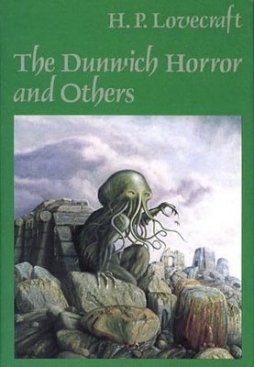 Bear in mind that “The Nameless City” is an early story. As he developed as a writer, I think Lovecraft’s adjectival art came to flourish in contrasts, or at least in gradations. There comes to be a delicate movement between scientific precision, which frequently opens a story, and a dread adjectival vagueness which grows as the story goes along. The typical narrator, at the start a scientist or scientific thinker analysing all the facts he can perceive, loses his ability to look reality in the face as the limits of his subjective comprehension and sanity are reached. He can only hint, say that he has seen something terrible but not describe what it was.
Bear in mind that “The Nameless City” is an early story. As he developed as a writer, I think Lovecraft’s adjectival art came to flourish in contrasts, or at least in gradations. There comes to be a delicate movement between scientific precision, which frequently opens a story, and a dread adjectival vagueness which grows as the story goes along. The typical narrator, at the start a scientist or scientific thinker analysing all the facts he can perceive, loses his ability to look reality in the face as the limits of his subjective comprehension and sanity are reached. He can only hint, say that he has seen something terrible but not describe what it was.
Sympathetic readers of Lovecraft will naturally find that vagueness acting as a spur to their own imagination. By ducking away from detail at the moments of greatest horror, Lovecraft leads his readers to fill in details of their own. I suspect this has two effects. Firstly, the reader projects his or her own most fears into the gap Lovecraft leaves. If a sound is, say, “indescribable”, how are you to imagine it? By thinking of what sound frightens you, and imagining the indescribable sound as like that — but, being indescribable, still worse. Lovecraft thus chills his readers with their own fears, heightened but yet only half-conscious.
Secondly, though, I suspect this has the effect of encouraging a sympathetic reader’s sense of the significance of Lovecraft. When you read his works, he as a writer leads you into a heightened state of imagination. I think the result is to encourage identification of the reader not with a character in the text, but with the text itself. Lovecraft matters to us because we collaborate with him more than most readers must with the stories they read.
At the same time, it’s important to observe that he makes it easy. The vagueness of the adjectives near the climaxes of his stories wouldn’t work if the framework of the stories around them didn’t work. That includes the precision of the earlier parts of the stories, but also includes the sense of emotional power and dread that arises from the structure and theme of his narratives.
 Consider “At the Mountains of Madness” to see how it all ties together. The story begins with very specific geographic and geological data, setting up a scientific expedition to the Anatarctic. A party from the expedition finds a range of massive mountains, and curious ruins, but stops communicating with their base camp; the narrator and another man goes to find them. The narrator, writing after the fact, grows vaguer as the story goes along, forcing himself to recall events and the strange things he found among the ruins, but despite himself telling his story increasingly through hints and references to strange old books. The most terrifying thing of all he cannot even relate, for he did not see it; only his companion did, and he will not speak of it, for it has driven him mad.
Consider “At the Mountains of Madness” to see how it all ties together. The story begins with very specific geographic and geological data, setting up a scientific expedition to the Anatarctic. A party from the expedition finds a range of massive mountains, and curious ruins, but stops communicating with their base camp; the narrator and another man goes to find them. The narrator, writing after the fact, grows vaguer as the story goes along, forcing himself to recall events and the strange things he found among the ruins, but despite himself telling his story increasingly through hints and references to strange old books. The most terrifying thing of all he cannot even relate, for he did not see it; only his companion did, and he will not speak of it, for it has driven him mad.
Specifically, says the narrator, “He has on rare occasions whispered disjointed and irresponsible things about ‘the black pit’, ‘the carven rim’, ‘the proto-shoggoths’, ‘the windowless solids with five dimensions’, ‘the nameless cylinder’, ‘the elder pharos’, ‘Yog-Sothoth’, ‘the primal white jelly’, ‘the colour out of space’, ‘the wings’, ‘the eyes in darkness’, ‘the moon-ladder’, ‘the original, the eternal, the undying’, and other bizarre conceptions; but when he is fully himself he repudiates all this and attributes it to his curious and macabre reading of earlier years.”
A lot of these fragments of course refer to elements beyond this story; they grow out of Lovecraft’s “Cthulhu mythos,” fragments seeded across his fiction which seem to bind his stories together with an almost-comprehensible mythology. The idea of the mythos is compelling; it touches something imaginatively. Although horrific, it’s also fascinating; given a few pieces, the reader wants to know more. Similarly, Lovecraft’s art is in a sense the ability simply to suggest more than he’s described, however many adjectives he’s used. The Mountains of Madness have yet greater mountains, and still more terrifying madnesses, on the far side. One wants to know more about them, and about the mythos of which they are a part, because one wants to see to what extremes of prose Lovecraft will be driven in describing them.
But I think this random collection of phrases also points to another kind of contrast in Lovecraft’s style, something almost as important as the distinction between precise detail and vague adjectives. That’s the contrast between elaborate but logically connected prose on one hand, and on the other fragmented lunatic speech which touches on themes and images of horror. Often the fragments are phrases which have meaning and power because of the story which has built up to them; but then sometimes they’re nonsense — the companion of the narrator in “At the Mountains of Madness” had an earlier episode where, faced with a horror too great for sanity to bear, he began repeating the names of Boston railroad stations.
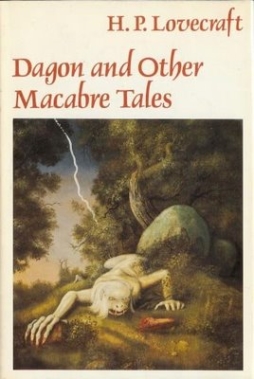 Lovecraft understood, I think, that one of the main characteristics of sane conscious thought is its connected nature. The coherency of his prose reflects the coherency of human understanding, and of human sanity. When that sanity is violated, the prose becomes incoherent — and falls into disconnected random phrases.
Lovecraft understood, I think, that one of the main characteristics of sane conscious thought is its connected nature. The coherency of his prose reflects the coherency of human understanding, and of human sanity. When that sanity is violated, the prose becomes incoherent — and falls into disconnected random phrases.
You could argue that the disconnection also shows in the reliance on vague adjectives, which at their most prolix may seem almost contradictory, breaking down the sense of a coherent thing that is being modified, rather than helping to define it (the voice at the end of “The Statement of Randolph Carter” isn’t just gelatinous, but “deep; hollow; gelatinous; remote; unearthly; inhuman; disembodied”). Or you could say that the use of disconnected language to depict a consciousness affected by an excessive understanding of the true strangeness of a non-human-centred universe anticipates (or recalls) the modernist techniques of Joyce, Pound, and especially Eliot. Lovecraft in fact refers to Eliot’s Waste Land in “The Case of Charles Dexter Ward”, and when reading Lovecraft it’s hard not to think of Eliot’s line in Four Quartets that “human kind / Cannot bear very much reality”.
It seems to me that, all in all, Lovecraft’s adjectives are often most precise when seeming the slackest. They insist on what things are not — unspeakable, unimaginable, and so on. They therefore insist on the limits of language when facing the horrors that underlie reality. And since language is a human creation, they also by extension insist again on the limits of the human mind.
Conversely, though, Lovecraft’s actual narratives insist on the potency of language. Perhaps Lovecraft’s most famous creation is the fictional text called the Necronomicon; in fact, various fictional texts populate his pages (The Book of Eibon, von Junzt’s Unaussprechlichen Kulten, and so on), hinting at knowledge that will provide some understanding or context for the cosmic mysteries. Oddly, these books seem very widely known; the party of polar explorers from Miskatonic University in “At the Mountains of Madness” all seem to have read the Necronomicon — the narrator, a geologist, refers to it, as does a character named Lake, a biologist (one wonders if perhaps it’s some kind of undergraduate intitiation at Miskatonic University to sneak into the library and read as far into the forbidden text as one can before being driven away in revulsion).
The hints never materialise; we never get the whole text of any of the fabulous books which seem to hold the secrets. If we did, perhaps we would go mad. Their words, Lovecraft implicitly assures us, have that power, if they are properly understood. The events his heroes (more properly ‘protagonists,’ or perhaps better, simply ‘narrators’) suffer through simply prepare them to fully understand those books. The events of the present are a gloss on the texts of the past.
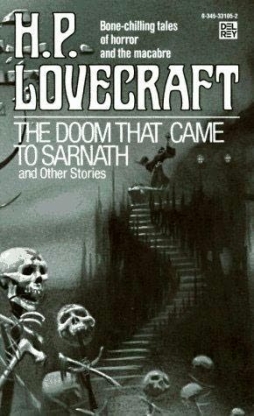 Many of Lovecraft’s narrator-protagonists are historians, or more precisely antiquarians; less professional, less methodical, less involved with an academic or learned community. In Lovecraft’s fiction, this only makes sense. If great races or great men of the past have uncovered all the cosmic secrets there are, then all discoveries become rediscoveries. It remains only to see if we can survive the uncovering of these dread knowledges.
Many of Lovecraft’s narrator-protagonists are historians, or more precisely antiquarians; less professional, less methodical, less involved with an academic or learned community. In Lovecraft’s fiction, this only makes sense. If great races or great men of the past have uncovered all the cosmic secrets there are, then all discoveries become rediscoveries. It remains only to see if we can survive the uncovering of these dread knowledges.
You can certainly argue that this perspective is inherently conservative, if not outright backward-looking. Or you could say that this is a pre-scientific and pre-modern world-view, in which history is seen as an inevitable entropic degeneration from a past golden age, rather than a progress from barbarism to enlightenment. What is certain is that it’s an outlook in which the historian, the reader of texts, becomes the bearer of knowledge — not the scientist, not the men who think they’re creating the future, whose dreams are in fact dangerous delusions.
If that’s a thematic preoccupation of Lovecraft, you can see it in the structure of his stories. The past overwrites the present. Given that he’s writing horror, though, it’s not surprising that he also often treats it as a horrific idea. While the past holds many profound secrets, it also by extension holds great danger. Minds from the past can project themselves into the present, or pull a present-day consciousness back into unguessed-of prehistory. Time becomes confused; the self is lost, a subjective illusion in a relativistic cosmos. Not only is reason and identity undermined, but corruption may emerge from the past; your own ancestors may have it in for you. That is “The Case of Charles Dexter Ward”; but it’s also one of his first published stories, “The Tomb”. The ambiguity can be seen clearly in “The Silver Key”, where Lovecraft has his alter-ego Randolph Carter “seal forever certain pages in the diary of a wild-minded ancestor” but also gain from his family the silver key which opens the gate of dreams.
Given these preoccupations of theme and structure, the stylistic pose Lovecraft so often adopts in his narrators’ voice only makes sense. His affection for archaisms, and his somewhat old-fashioned (but always crystal-clear) sentence structure, are of a piece with his concern with the past and with the process of degeneration in time.
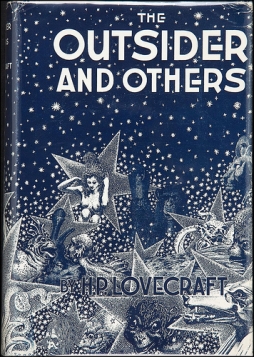 It’d be a mistake, though, to think Lovecraft only spoke to historians or to self-conscious antiquarians. In fact, Lovecraft’s modernity is frequently startling. Obviously his conception of the universe, the centreless, relativsitc world he wrote about, followed from then-new ideas in physics. But at the same time, characters refer to contemporary theories of continental drift or evolutionary biology. It must have seemed cutting-edge at the time; it’s a salutory lesson to think that now maybe more than anything else in Lovecraft, they feel quaint.
It’d be a mistake, though, to think Lovecraft only spoke to historians or to self-conscious antiquarians. In fact, Lovecraft’s modernity is frequently startling. Obviously his conception of the universe, the centreless, relativsitc world he wrote about, followed from then-new ideas in physics. But at the same time, characters refer to contemporary theories of continental drift or evolutionary biology. It must have seemed cutting-edge at the time; it’s a salutory lesson to think that now maybe more than anything else in Lovecraft, they feel quaint.
References aside, though, it’s that conception of a decentred universe that still has a modern ring. It’s a central thematic idea, and therefore a central structural idea: the horror in Lovecraft’s stories derives from it. It’s not just that, like Nietszche, he imagines a godless universe. He imagines a universe stranger than man can know, shaped by gods or godlike races also stranger than man can know and frequently hostile to mortal sanity, and then imagines those gods as being themselves contingent things.
Chronology itself is flexible in many of his stories. Lovecraft had a powerful sense of form; he knew to put the most horrific element of a story at the very end. The horror becomes the climax of the story. Events that happened subsequent to that moment are told first, and act as foreshadowing. The horror comes to have a sense of inevitability. You might well guess what it is, but when it’s finally unveiled there’s a sense of confirmation, of fulfillment — indeed of catharsis, so we might say that Lovecraft’s horror acts like classical tragedy.
The nature of that horror, again, often derives from some kind of violation of time as human beings understand it. There is a cosmic timeline that humans have never guessed; there is an insistence of previous eras wholly unknown. And this past takes its revenge on the present. Lovecraft’s world is most like the real world in its faithful acceptance of the second law of thermodynamics: everything runs down. Everything degenerates.
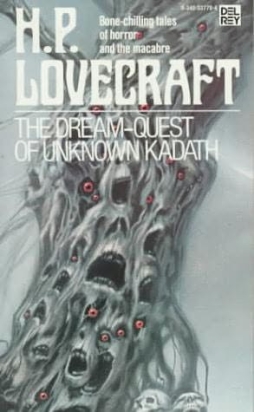 Among the recurring images in Lovecraft’s fiction, the glacial plateaus and underground abysses, there is always degeneration. Always rot and corruption. Reality is not something that can be improved by political action or revolution or scientific progress. The world, in Lovecraft’s writing, is inherently fallen; it exists in opposition to the beauty of dream and fiction. In this sense, Lovecraft may be said to be an idealist — he cared for the ideal, and not the real.
Among the recurring images in Lovecraft’s fiction, the glacial plateaus and underground abysses, there is always degeneration. Always rot and corruption. Reality is not something that can be improved by political action or revolution or scientific progress. The world, in Lovecraft’s writing, is inherently fallen; it exists in opposition to the beauty of dream and fiction. In this sense, Lovecraft may be said to be an idealist — he cared for the ideal, and not the real.
The paradox, of course, is that this concern with beauty went hand-in-hand with ugly racist beliefs. The degeneration of the real world is symbolised, in Lovecraft, by non-Nordic ethnicities. There’s a fear of miscegenation, of mixing with the inhuman. But I suspect this had a directly personal resonance, as well. Only in a way that had nothing to do with race; I think Lovecraft feared corruption of the blood because he feared there was a weakness in his own ancestry. Lovecraft probably never knew that his father died of syphilis (an inheritable disease), but he would have known he died in an asylum (and indeed asylums recur in his fiction, often linked with, or the setting for, mysterious deaths). I think that the fear of corruption, fear of something in the past of one’s family coming back to take possession of the present-day self, may have derived from that, and helped drive not only his racism, but his writing; it’s fascinating to read “The Dunwich Horror” and “The Shadow Over Innsmouth” as a reflection of Lovecraft’s fears about what he might have inherited from his father.
But even if these fears did speak to Lovecraft on a personal level, what matters is what he did with them. In fact there does seem to be a desire to escape the human body, its corruption and physical bounds. The pseudo-utopian “Shadow Out of Time” involves the transference of a human mind into a thoroughly inhuman body, indeed to an entity difficult even to physically visualise, and Lovecraft seems to have thought himself into an alien mentality to describe the entity and its culture. The story creates a convincing sense that the Great Race it describes is in essence not human; that their history, although described in terms of wars, exploration, and colonisation, is somehow not as ours — we understand their background in those terms only because we, in our limited way, see ourselves in their actions. The core of what makes them what they are, their identity, seems to lie elsewhere. If human history is about power, or scientific progress, their history is about something else that we would not recognise.
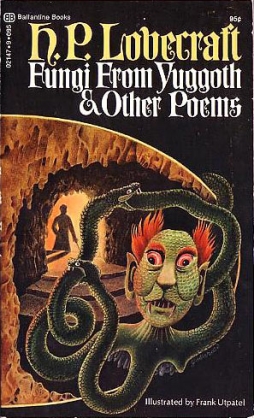 This distance from the human shows itself in the peculiar structure of many of the stories. There aren’t many vivid characters in Lovecraft, but nor are there vivid scenes, in the sense of two characters with opposing desires entering into conflict. There aren’t even many occasions were characters exchange dialogue; mostly, dialogue’s summarised, and events are described quickly. Usually the main action of a story involves a lone character exploring some strange place; underground chasms, tombs, laboratories. Much of the rest is presented as oddly involving exposition, which the reader assembles into a pattern that gives the described action more resonance. It’s a structure based around vivid moments.
This distance from the human shows itself in the peculiar structure of many of the stories. There aren’t many vivid characters in Lovecraft, but nor are there vivid scenes, in the sense of two characters with opposing desires entering into conflict. There aren’t even many occasions were characters exchange dialogue; mostly, dialogue’s summarised, and events are described quickly. Usually the main action of a story involves a lone character exploring some strange place; underground chasms, tombs, laboratories. Much of the rest is presented as oddly involving exposition, which the reader assembles into a pattern that gives the described action more resonance. It’s a structure based around vivid moments.
The narratives acquire a weird oneiric pace as a result. The narrator of “At the Mountains of Madness” is accompanied for much of the story by a colleague named Danforth; but Danforth’s introduced haphazardly, never really described, and never comes alive as a vivid character in his own right — he’s a graduate student, but we never even learn what his discipline is, much less his specific field of study. And yet somehow this feels natural, even lifelike; you can’t predict who, as your life goes on, turns out to be important to you, and sometimes you don’t learn the most basic things about those close to you.
Ultimately, rather than follow a character into a horrific situation, Lovecraft’s horror is more conceptual. We watch characters struggle to piece together the horrors around them, and find ourselves as detached observers better able to make sense of things than they are — and therefore we come to understand the horror better than they do. The horror is literally a horror of concepts. Rather than identify with a character, we are put (to a thankfully limited extent) in the uncomfortable situation of being a character in a horror story.
Countering Lovecraft’s tendency to have his stories be dominated by exposition is his tendency to anchor his stories in a concrete sense of place. Sometimes the place is fantastic, but most often he describes some aspect of New England life. Cities and old houses are particularly common. The greatest expression of this, I think, is “The Dream-Quest of Unknown Kadath,” where the love of place drives the main character (and here there truly is a character, with thoughts and dreams of his own) to find his heart’s desire.
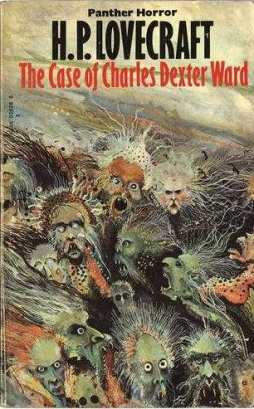 I think Lovecraft had a keen understanding of human psychology, at least in certain senses. He was no Freudian, but was aware of the fragility of the conscious self, which could be undermined by the limitations of the body and the mysteries held in the unconscious. But most especially, he was aware of the power of fear. The first sentence of his essay “Supernatural Horror in Literature” is one of the truest things anyone ever wrote: “The oldest and strongest emotion of mankind is fear, and the oldest and strongest kind of fear is fear of the unknown.”
I think Lovecraft had a keen understanding of human psychology, at least in certain senses. He was no Freudian, but was aware of the fragility of the conscious self, which could be undermined by the limitations of the body and the mysteries held in the unconscious. But most especially, he was aware of the power of fear. The first sentence of his essay “Supernatural Horror in Literature” is one of the truest things anyone ever wrote: “The oldest and strongest emotion of mankind is fear, and the oldest and strongest kind of fear is fear of the unknown.”
That’s obviously a useful thing for a horror writer to believe. But you could also say that his work was an extended and largely successful attempt to justify it. From a certain point of view, his body of work is an extended meditation on fear, and how people react to fear — how they lose their identity, their sanity, their coherence as an individual when faced with the things they fear the most.
But arguably more significant even than that was Lovecraft’s creation or enunciation of a new type of fear. He anticipated Sartre and the existentialists in his dread of empty cosmic spaces; in his depiction of the fear that some minds feel when contemplating a godless universe, a universe with no objective morality and no certain place for oneself or humanity in general. One can certainly argue, though, that Lovecraft went beyond the exisitentialists in embracing this new state of the universe.
There’s a cosmic irony in much of Lovecraft’s work that’s often unrecognised. The first line of “The Shunned House” tells us “From even the greatest of horrors irony is seldom absent.” In fact, it seems as though in his early work he wrestles with balancing corrosive irony with his unearthly, idealised visions. I think 1926 was a key year for him in that sense; not only was it the year he wrote “The Call of Cthulhu” and began “The Dream-Quest of Unknown Kadath,” but he also wrote “The Silver Key,” which explicitly works through the tension between irony and fantasy. It’s a story that justifies writing fantasy, and heralds a move deeper into the fantastic and horrific.
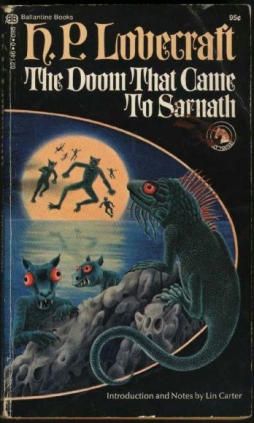 But irony in Lovecraft is never simple sarcasm, much less a sending-up of what he’s writing. Instead, in keeping with his cosmic viewpoint, it is a cosmic irony in which all the drives and meaning of humanity are viewed as pointless in the grand scheme of things, only the ludicrous obsessions of self-obsessed tiny minds. So the desires and hopes and fears of his protagonists are necessarily irrelevant; they’re undermined as in “The Shadow Over Innsmouth”, or else come to nothing in the face of the hideous truth, as in, say, “At the Mountains of Madness”. The lack of memorable characters therefore ties in with Lovecraft’s sense of the irrelevance of the human. And not only of humans; Lovecraft as writer is above and beyond the Old Ones, as well. Lovecraft may have learned some of this approach from Lord Dunsany, who he idolised and who described his own fantastic Gods with a very genial skepticism, but he took it much further and made something out of it that was more radically new.
But irony in Lovecraft is never simple sarcasm, much less a sending-up of what he’s writing. Instead, in keeping with his cosmic viewpoint, it is a cosmic irony in which all the drives and meaning of humanity are viewed as pointless in the grand scheme of things, only the ludicrous obsessions of self-obsessed tiny minds. So the desires and hopes and fears of his protagonists are necessarily irrelevant; they’re undermined as in “The Shadow Over Innsmouth”, or else come to nothing in the face of the hideous truth, as in, say, “At the Mountains of Madness”. The lack of memorable characters therefore ties in with Lovecraft’s sense of the irrelevance of the human. And not only of humans; Lovecraft as writer is above and beyond the Old Ones, as well. Lovecraft may have learned some of this approach from Lord Dunsany, who he idolised and who described his own fantastic Gods with a very genial skepticism, but he took it much further and made something out of it that was more radically new.
All of the preceding is my attempt to explain why Lovecraft’s still read and still important. But it also shouldn’t be forgotten that he was an excellent technical horror writer. His effects are well-calculated, and tie in to his themes and the particular atmosphere and tone he imagined. When he chose to present prosaic details to lay the groundwork for later horrors, he did so convincingly; and then he also knew how to use a range of imagery to give depth to those horrors. Consider the gradation from academic precision to cosmic horror in “At the Mountains of Madness,” and then consider the surrealism of the main characters encountering giant albino penguins waddling about the great ruined city just before encountering the worst of all horrors. The surrealism enhances the horror by giving it depth, an unexpected dimension.
Lovecraft’s paragraphs are long, but well-structured; indeed, they sometimes feel over-tidy. His sentences may run long, but rarely feel too complex structurally. His rhythmic sense is keen, although admittedly easily imitated or parodied. In every way I can think of, Lovecraft demonstrated that he knew how to write prose. So why do so many people dislike his writing style?
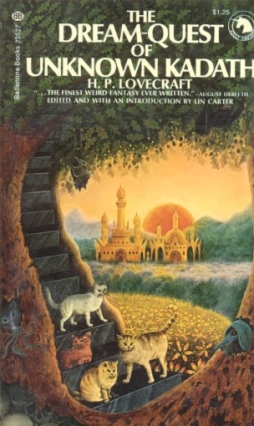 I think it’s just that he was trying to do something unusual. I think he was deliberately avoiding typical strategies of scene-building and character-building. I think he envisioned the art of narrative in an unusual way, a way relevant to the themes that drove him, and his style and structure followed from that. It’s certainly something that’s not to everybody’s taste, and Lovecraft himself seemed to imply that he expected as much; in “Supernatural Horror in Literature” he said that the appeal of the weird tale “if not always universal, must necessarily be poignant and permanent to minds of the requisite sensitiveness.”
I think it’s just that he was trying to do something unusual. I think he was deliberately avoiding typical strategies of scene-building and character-building. I think he envisioned the art of narrative in an unusual way, a way relevant to the themes that drove him, and his style and structure followed from that. It’s certainly something that’s not to everybody’s taste, and Lovecraft himself seemed to imply that he expected as much; in “Supernatural Horror in Literature” he said that the appeal of the weird tale “if not always universal, must necessarily be poignant and permanent to minds of the requisite sensitiveness.”
In fact, Lovecraft’s weird fiction has a greater claim to universality than perhaps any other. It’s survived, when it easily might have been lost to the obscurity of old pulp magazines and amateur journalism. And it’s flourished, not only with readers but, crucially, with other writers, who’ve kept his influence alive in their own writing as the years have gone on. I’ve tried to explain why his writing has done this when so many of his contemporaries did not. I think he was technically skilled, and possessed of incredible originality of vision. I think his style reflected his ideas and obsessions.
But most of all, at the end of everything, I think his prose works. I think the rhythms are strong, I think the diction’s original, I think the adjectives are more startling and evocative than they are cloying or vague. Lovecraft may not be Keats, not all the time, but he has alien corn all his own. It’s not going to be to everyone’s taste — but for some of us, it’s unforgettable.
Matthew David Surridge is the author of “The Word of Azrael,” from Black Gate 14. His blog is Hochelaga Depicta.
Excellent post. I’ve always found Lovecraft’s style to be part of his appeal. Love it or hate it, it’s uniquely his voice.
Truly excellent, Matthew. Top-drawer stuff.